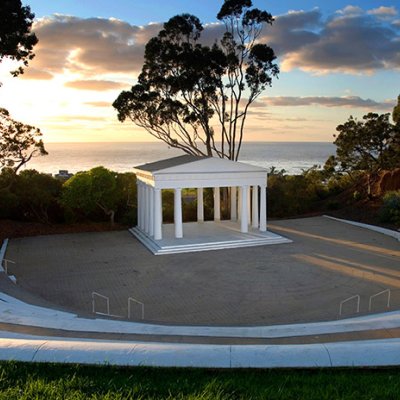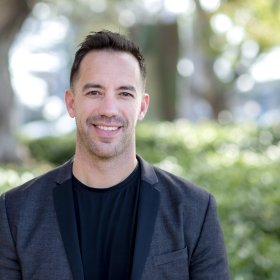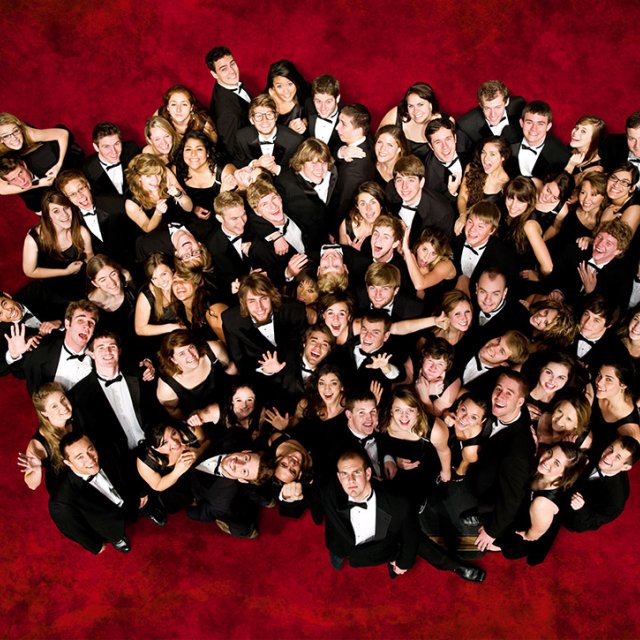The renowned composer George Frederic Handel once said, “I would be disappointed if I had only entertained them. I had wished to make them better.” With a degree in music, you’ll learn not only about the great Baroque composers like Handel, but how you too can leave an impact on audiences through performance. The knowledge you learn from this program will set you up for success in the performance industry, teaching, ministry, and art.
At PLNU, our music program centers on four outcomes:
- Learning music history and theory
- Developing applied music skills in your primary performance area
- Become well-versed in the essential outlines of music literature
- Exploring significant non-Western musical styles
Job outlook for music careers
Jobs in the music industry will remain steady, but competitive. According to the U.S. Bureau of Labor Statistics, the employment of musicians and singers is projected to grow 1% from 2019 to 2029. However, with the knowledge you’ll gain from your music studies, you’ll be prepared for many jobs within the music industry. According to the U.S. Bureau of Labor Statistics, overall employment of broadcast, sound, and video technicians is projected to grow 9% from 2019 to 2029.
What can you do with a music degree?
Many graduates of PLNU’s music program have gone on to be successful singers, songwriters, and performers. Others have become music or dance instructors for middle or high schools, postsecondary teachers, composers, or even sound technicians. Our graduates are known in these positions for applying their learned skills of musicianship.
Some of the positions our graduates currently hold:
Musicians and Singers
2020 Median annual salary: $41,950
Musicians and singers play instruments or sing for live audiences or in recording studios. Musicians can play solo or in bands, orchestras, small groups, and other ensembles. Those in bands play in a variety of venues while others try to build enough fans to get a recording contract or representation by an agent.
Necessary attributes and skills:
- Music theory
- Expertise in reviewing and interpreting musical scores
- Versatile knowledge of your specialized vocal emphasis or instrument
- Time management and organization for rehearsals and performances
Music Directors and Composers
2020 Median annual salary: $52,250
Music directors lead musical groups and ensembles during performances and recording sessions while composers create and write music for performance. Directors and composers work for a variety of groups like religious organizations and schools, or can even be self-employed. In these positions, they often get to share their unique expression and knowledge of music and the arts with the support of a choir or orchestra.
Necessary attributes and skills:
- Music theory
- Music instruction
- Expertise in reviewing and interpreting musical scores
- Conducting skills
- Versatile knowledge of a wide range of instruments
- Time management and organization for rehearsals
Audio and Video Technicians
2020 Median annual salary: $47,420
Audio and video technicians set up and operate the electrical equipment for media programs. They can utilize their skills for website, podcast, performance, or broadcast settings. These technicians operate equipment in studios, schools, office buildings, performance buildings, radio and television stations, and many more settings.
Necessary attributes and skills:
- Knowledge of how to convert video and audio recordings into digital formats
- Experience using audio and editing programs for conversion to website
- Operate, monitor, and adjust audio, video, sound, lighting, and broadcast equipment
- Experience using complex software such as recording equipment or computers
- Unique ideas for creative shots or editing flourishes
Music, Dance, and Extracurricular Instructors
2020 Median annual salary: $47,015
Music, dance, and extracurricular instructors cover a nuanced title for a wide range of instructional topics. Dance instructors can teach many different styles from ballroom to hip-hop. Likewise, music instructors teach many different genres of music from instrumental to vocal depending on what you desire your emphasis to be. You can often find job openings for music or dance instructors at gyms, schools, and community centers. Most instructors reach a wide range of clientele from seniors at the recreation center to students at an after-school program in high schools.
Necessary attributes and skills:
- Sufficient knowledge of your particular art
- Ability to design courses and classes
- Ability to use initiative
- Excellent verbal communication skills and instructional skills
- Ability to work well with others
- Leadership skills
With a degree in music, you’ll have the knowledge to perform and develop your passion for performance. Additionally, you’ll have the skills to help others understand the profound impact music has on those around us. This degree can set you up for success in the music industry and beyond.
Start off on a strong note and apply to PLNU today. To learn more, get connected with one of our counselors for additional support and to answer any questions you may have.
I've been a freelance bass player which has taken me all over the world with different artists, as well as working in clubs and studios in Southern California. Being creative and making music with people is one of my greatest joys, and I find my role in it to be incredibly meaningful.
The culture of the music department when I was there was perfect for where I was in my development as a musician. I found peers who had the same ambitions to grow, and we made each other better. In fact, most of those people are still making a living in the music industry as well.
I thrived in the intimate environment at PLNU. I think I would've gotten a bit lost at a large school. The relationships I made as a result have helped push me in my career and into the person that I am today.
Daniel Rhine, Class of 2004
Professional Bass Player






